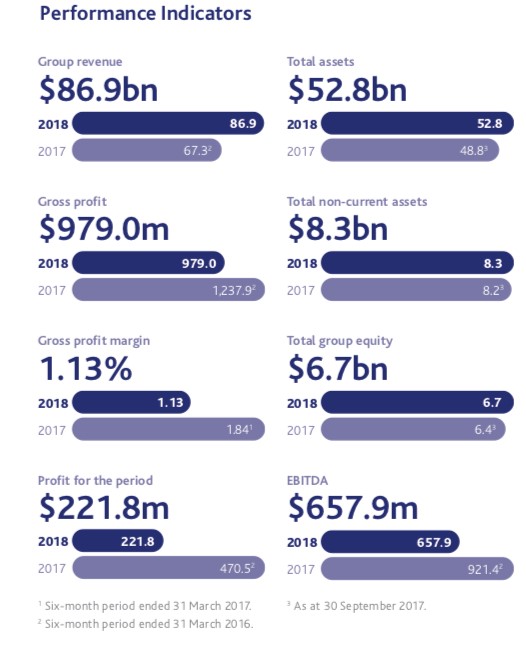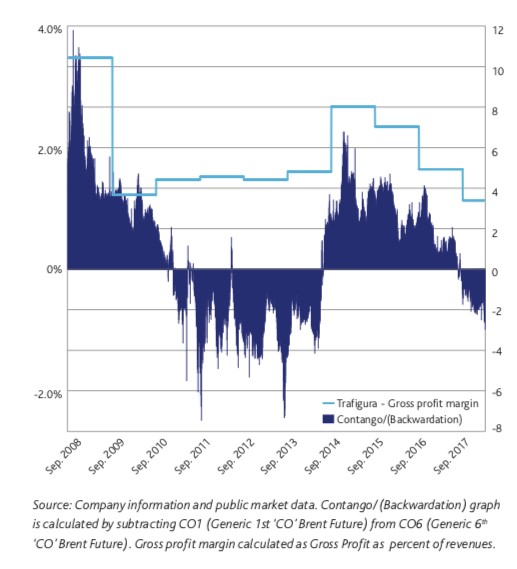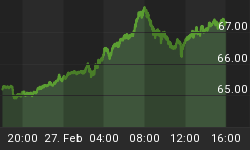Higher oil prices may be a bit of a boon for producers, but Swiss commodity giant Trafigura isn’t one of the beneficiaries; in fact, it’s seen a 50-percent shed in profits for the first half of its fiscal year because the days of buying and storing cheap crude are over.
And that’s not Trafigura’s only problem. It’s metals division has been able to pick up the oil-trading slack, resulting in the company’s lowest first-half profit take in four years.
The Swiss commodity trader saw net income drop 53 percent to $222 million in the six months through March. That’s down from $471 million the previous year. It’s also the worst case since 2014.
For one of the biggest independent oil and metals traders in the world, the end of oil contango is a blistering one.
With oil rising above $80 per barrel this year, commodity traders with a large oil focus have been wrong-footed. Since the oil price crisis, they’ve been buying cheap crude and storing it, saving it up for high-margin sales when prices rise. But in the meantime, some other variables have stepped in to make this strategy more difficult to profit on, including interest rate hikes and competition. Related: How Russian Gold Production Will Help Ditch The Dollar
According to a statement from Trafigura released on Wednesday, “Pressure on margins, resulting from a change in the structure of the oil market, caused a fall in Trafigura Group’s profit for the first half of its 2018 financial year.”

(Click to enlarge)
More specifically, Trafigura said “the fall in profitability was the result of a major shift in the oil market during the period from a contango structure, where forward prices are higher than spot prices and act as an incentive to hold inventories, to the opposite condition of backwardation, where holding stocks is costly. The oil market became backwardated in October 2017 as a consequence of rising spot prices in response to production curbs led by OPEC.”
In an attempt to rebalance the equation, Trafigura “undertook substantial restructuring” of its trading books and tried to reduce costs by shrinking inventories and “radically adjusting” its storage commitments.
But it was too late in the day…
Trading margins were already coming under significant pressure, and gross profits in the oil trading division fell to $299 million in the period, from $652 million a year earlier.

(Click to enlarge)
The group’s metals trading division performed well, but not enough to offset the oil trading loss.
According to the Financial Times, while Trafigura and Vitol are increasing trading volumes to boost earnings and cut costs, trading group Mercuria is banking on “complex structured financing deals to underpin margins or refining”.
Reuters reports Trafigura’s traded oil volume up 16 percent to 5.8 million barrels per day from September 2017 to March 2018.
Oil contango to backwardation aside, it’s shaping up to be a bad year for commodity traders.
Glencore is also feeling massive pressure, but of a different kind.
In April, Glencore’s mining business in the Democratic Republic of Congo (DRC) was slapped with a mining freeze by Israeli businessman Dan Gertler, for unpaid royalties to the tune of $3 billion.
Related: These Are The Top Gold Producing Countries In The World
The problem for Glencore is that Gertler is on the U.S. blacklist as a “Specially Designated National”; in other words, he’s under sanction.
At stake is a lot of cobalt, one of the key battery metals for electric vehicles.
Today, Glencore embarked down an interesting path, announcing it planned to actually pay Gertler off, despite sanctions. It’s a test to see what Washington will do, according to the Wall Street Journal. And it’s a big risk.
By Damir Kaletovic for Safehaven.com
More Top Reads From Safehaven.com:
















